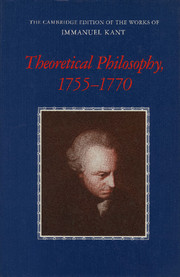Book contents
- Frontmatter
- Contents
- General editors' preface
- Preface
- Guide to abbreviations
- General introduction
- Introductions to the translations
- Résumés of the works
- A NEW ELUCIDATION OF THE FIRST PRINCIPLES OF METAPHYSICAL COGNITION (1755)
- THE EMPLOYMENT IN NATURAL PHILOSOPHY OF METAPHYSICS COMBINED WITH GEOMETRY, OF WHICH SAMPLE I CONTAINS THE PHYSICAL MONADOLOGY (1756)
- AN ATTEMPT AT SOME REFLECTIONS ON OPTIMISM (1759)
- THE FALSE SUBTLETY OF THE FOUR SYLLOGISTIC FIGURES (1762)
- §1 General concept of the nature of syllogisms
- §2 Concerning the supreme rules governing all syllogisms
- §3 Concerning pure and mixed syllogisms
- §4 In the so-called first figure only pure syllogisms are possible. In the remaining three figures nothing but mixed syllogisms is possible
- §5 The logical division of the four syllogistic figures is a piece of false subtlety
- §6 Concluding reflection
- THE ONLY POSSIBLE ARGUMENT IN SUPPORT OF A DEMONSTRATION OF THE EXISTENCE OF GOD (1763)
- ATTEMPT TO INTRODUCE THE CONCEPT OF NEGATIVE MAGNITUDES INTO PHILOSOPHY (1763)
- INQUIRY CONCERNING THE DISTINCTNESS OF THE PRINCIPLES OF NATURAL THEOLOGY AND MORALITY (1764)
- M. IMMANUEL KANT'S ANNOUNCEMENT OF THE PROGRAMME OF HIS LECTURES FOR THE WINTER SEMESTER 1765 — 1766 (1765)
- DREAMS OF A SPIRIT-SEER ELUCIDATED BY DREAMS OF METAPHYSICS (1766)
- CONCERNING THE ULTIMATE GROUND OF THE DIFFERENTIATION OF DIRECTIONS IN SPACE (1768)
- ON THE FORM AND PRINCIPLES OF THE SENSIBLE AND THE INTELLIGIBLE WORLD [INAUGURAL DISSERTATION] (1770)
- Factual notes
- Bibliographies of editions and translations
- Glossary
- Biographical-bibliographical sketches of persons mentioned by Kant
- Index
§3 - Concerning pure and mixed syllogisms
Published online by Cambridge University Press: 18 December 2014
- Frontmatter
- Contents
- General editors' preface
- Preface
- Guide to abbreviations
- General introduction
- Introductions to the translations
- Résumés of the works
- A NEW ELUCIDATION OF THE FIRST PRINCIPLES OF METAPHYSICAL COGNITION (1755)
- THE EMPLOYMENT IN NATURAL PHILOSOPHY OF METAPHYSICS COMBINED WITH GEOMETRY, OF WHICH SAMPLE I CONTAINS THE PHYSICAL MONADOLOGY (1756)
- AN ATTEMPT AT SOME REFLECTIONS ON OPTIMISM (1759)
- THE FALSE SUBTLETY OF THE FOUR SYLLOGISTIC FIGURES (1762)
- §1 General concept of the nature of syllogisms
- §2 Concerning the supreme rules governing all syllogisms
- §3 Concerning pure and mixed syllogisms
- §4 In the so-called first figure only pure syllogisms are possible. In the remaining three figures nothing but mixed syllogisms is possible
- §5 The logical division of the four syllogistic figures is a piece of false subtlety
- §6 Concluding reflection
- THE ONLY POSSIBLE ARGUMENT IN SUPPORT OF A DEMONSTRATION OF THE EXISTENCE OF GOD (1763)
- ATTEMPT TO INTRODUCE THE CONCEPT OF NEGATIVE MAGNITUDES INTO PHILOSOPHY (1763)
- INQUIRY CONCERNING THE DISTINCTNESS OF THE PRINCIPLES OF NATURAL THEOLOGY AND MORALITY (1764)
- M. IMMANUEL KANT'S ANNOUNCEMENT OF THE PROGRAMME OF HIS LECTURES FOR THE WINTER SEMESTER 1765 — 1766 (1765)
- DREAMS OF A SPIRIT-SEER ELUCIDATED BY DREAMS OF METAPHYSICS (1766)
- CONCERNING THE ULTIMATE GROUND OF THE DIFFERENTIATION OF DIRECTIONS IN SPACE (1768)
- ON THE FORM AND PRINCIPLES OF THE SENSIBLE AND THE INTELLIGIBLE WORLD [INAUGURAL DISSERTATION] (1770)
- Factual notes
- Bibliographies of editions and translations
- Glossary
- Biographical-bibliographical sketches of persons mentioned by Kant
- Index
Summary
Everybody knows that there are immediate inferences, where from one judgement the truth of another judgement is cognised immediately without an intermediate concept. For this reason, such inferences are not syllogisms. For example, from the proposition: All matter is changeable, there immediately follows the proposition: that which is not changeable is not matter. The logicians enumerate different types of such immediate inferences. Without doubt, the most important immediate inferences are those which are based upon logical conversion, and likewise those which are based upon contraposition.
Now, if a syllogism is the product of three propositions only, and if it is in accordance with the rules which have just been explained and which are valid of every syllogism, then I call it a pure syllogism (ratiocinium purum). If, however, it is only possible by combining more man three judgements, it is a mixed syllogism (ratiocinium hybridum). Suppose, namely, that between the three main propositions there has to be inserted an inference which has been derived immediately from them, and that, therefore, an extra proposition is added, over and above what is allowed in a pure syllogism, the syllogism is a ratiocinium hybridum. For example, suppose that someone were to argue as follows:
Nothing which is perishable is simple;
Consequently, nothing simple is perishable;
The soul of man is simple;
Therefore, the soul of man is not perishable.
Anyone who argued in this fashion would, it is true, not have a genuinely compound syllogism, for that would have to consist of a number of syllogisms. But this syllogism contains, in addition to what is required of a syllogism, an extra inference, arrived at immediately by contraposition; the syllogism thus contains four propositions.
But even if only three judgements were really expressed, the conclusion could only be drawn from these judgements by means of legitimate logical conversion, or by contraposition or some other logical transformation of one of these premises, so that the syllogism would, notwithstanding, still be a ratiocinium hybridum.
- Type
- Chapter
- Information
- Theoretical Philosophy, 1755–1770 , pp. 92 - 93Publisher: Cambridge University PressPrint publication year: 1992

